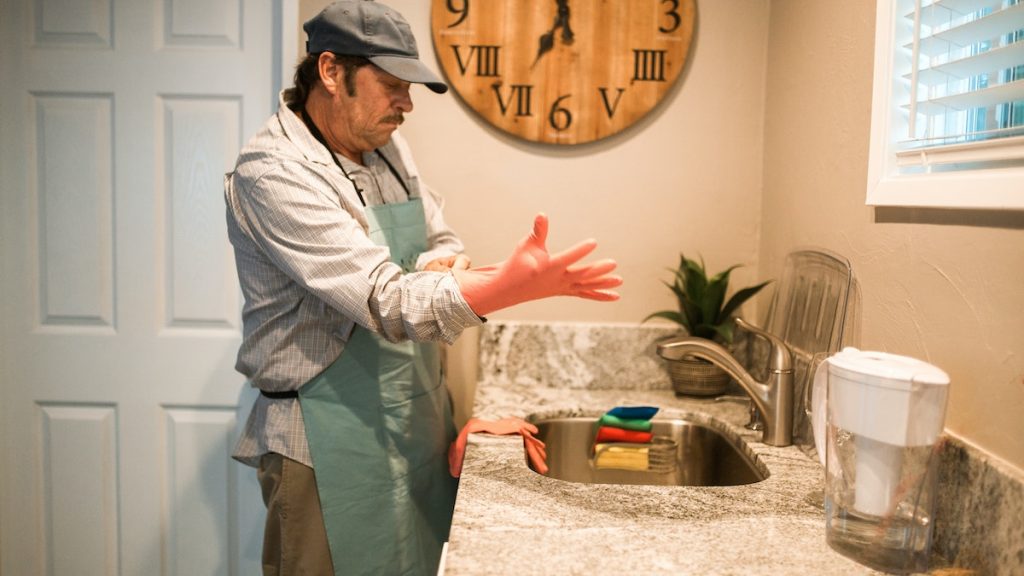We all know the feeling: staring at the milky water in your sink slowly swirling around, not necessarily draining, just floating around with the chunks of cereal and scrambled eggs. Don’t worry; we know it is as gross as it sounds. We do not want this happening: we want a sink that drains fast and well. This is, unfortunately, not always the case, though.
Various issues, including clogged drains, hard water, broken pipes, improper installation, venting issues, and old or faulty pipes, can cause a slow-draining sink. The first thing you will want to do if you are experiencing slow drainage is identify the cause of the issue and address it promptly to prevent further damage and potential health hazards.
Knowing why your sink may be slow-draining is critical, but ensuring that you take the necessary steps, such as hiring a professional plumber, can fix the issue after identifying it.
Table of Contents
Top 7 Common Causes for a Slow-Draining Sink
1. A clogged drain
A clogged drain is one of the most intuitive reasons for the lack of draining from a sink. Over time, debris such as hair, soap scum, and food particles can accumulate in the drain and create a blockage. This blockage can prevent water from flowing freely down the drain, resulting in slow drainage.
The first thing you may want to try is clearing the blockage with a plunger or drain cleaner. If those solutions, alongside some elbow grease, do not work to solve your issue, the services of a professional plumber like Birnie Plumbing can be just the thing you need! Addressing a clogged drain immediately is important to prevent further damage and potential health hazards.
2. Grease buildup
Another reason for a clogged drain, often very common in kitchen sinks, is grease buildup. If you pour grease or cooking oil down your sink while it is still hot, it can later cool down, solidify and create a blockage in your pipes.
Over time, this can lead to slow drainage and other plumbing issues. To avoid grease buildup, it’s important to dispose of cooking oil and grease properly. You can pour it into a container, throw it away in the trash, or recycle it if possible.
3. Hard water
As we mentioned earlier, hard water may be one of the reasons that your sink is slow-draining. What exactly is hard water, though? Water with high mineral content, such as calcium and magnesium, can leave mineral deposits in your pipes over time.
These deposits can accumulate and create a blockage within the pipes (where water should be flowing freely), leading to slow drainage. Installing a water softener or descaling the pipes can help prevent this issue in the future!
4. Broken pipes
As much as we wish it were not this option, occasionally, one of the reasons your sink may be slow-draining is because of broken pipes. Over time, pipes can become corroded or damaged, leading to slow drainage and other plumbing issues. This is especially common in older homes with galvanized or cast iron pipes.
A broken pipe can cause water to back up and drain slowly. If you suspect a broken pipe, it is important to contact a plumber immediately to prevent further damage and ensure that your issue is fixed as soon as possible!
5. Improper installation
If you have just moved into a new place or installed a new sink, it is unlikely that your sink will be draining slowly. The silver lining is that if this is the case, you know exactly what the cause is and how you can fix it. The main reason why an improper installation is detrimental is that it can cause issues with drainage.
For example, if the drain pipe is not angled correctly, water may not be able to flow freely and will drain slowly. Improper installation can also cause leaks and other plumbing issues— none of which we want. Similarly, it is important to have your sink installed by a licensed plumber to ensure it is done correctly.
6. Structural issues with your home
Similar to the above, it may not always be because of water and clogged drains. It can be because of the structural integrity of your home. For instance, if your home’s foundation is shifting or settling, it can cause your plumbing system to become misaligned or damaged.
This can lead to slow drainage and other plumbing issues. If you suspect structural issues, contacting a professional to assess the situation and recommend the best action is important.
7. Issues with venting
Sinks, like people, are all different. Your sink may be connected to a vent pipe that allows air to escape as water flows through the drain. If this vent pipe is blocked or damaged, it can cause the problem you are experiencing. Venting issues can also cause unpleasant odours to emanate from your sink. As such, if you notice these two issues together, the issue is likely with your venting!
Alex is fascinated with “understanding” people. It’s actually what drives everything he does. He believes in a thoughtful exploration of how you shape your thoughts, experience of the world.

